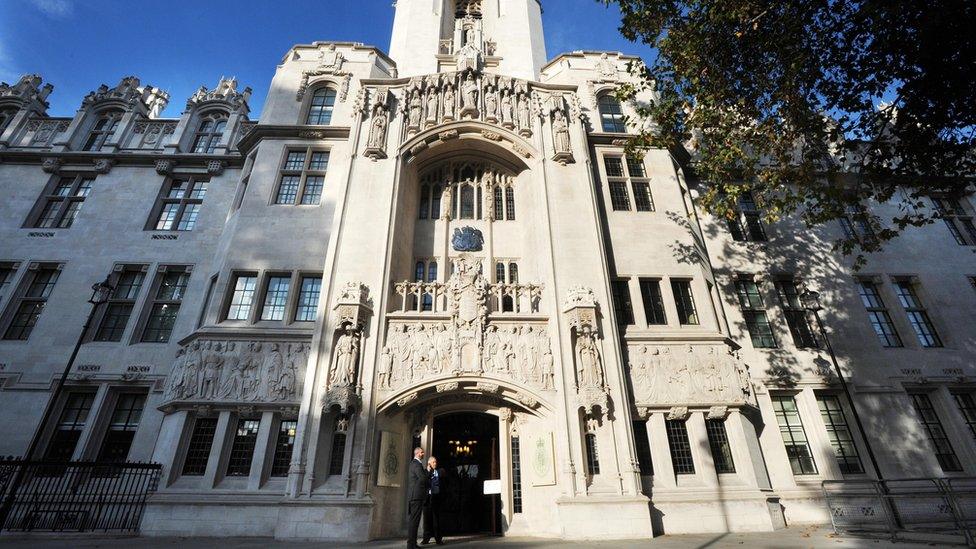Facebook 'strangle' post: Woman wins libel battle against ex-husband
- Published

Nicola Stocker made the comments in an online exchange with her ex-husband's new partner
A woman has won a libel battle against her ex-husband over comments she made on Facebook about him trying to strangle her.
Nicola Stocker, 51, made the remarks about Ronald Stocker in an online exchange with his new partner in 2012.
Mr Stocker previously won his case at London's High Court after it was ruled people reading Mrs Stocker's post would have thought he tried to kill her.
But the ruling has now been overturned by the Supreme Court.
A panel of five justices said the High Court judge, Mr Justice Mitting, made a legal error by using the dictionary definition of "strangle" when he ruled Mrs Stocker's comment meant her ex-husband "tried to kill" her.

The court heard Ronald Stocker left red marks on Nicola Stocker's neck which were visible two hours after the incident
Giving their ruling, Lord Kerr said: "In consequence, he failed to conduct a realistic exploration of how the ordinary reader of the post would have understood it.
"In view of the judge's error of law, his decision as to the meaning of the Facebook post cannot stand."
Lord Kerr said the "ordinary reader" would have understood the comments to mean Mr Stocker, 68, grasped the neck of his ex-wife and not that he tried to kill her.
Mr Stocker said he was "disappointed" with the judgement after previous courts - the High Court and the Court of Appeal - had found in his favour.

Analysis
Clive Coleman, BBC legal affairs correspondent
Although judges in the lower courts have pointed up the importance of "context" in libel actions based on social media posts, this is the first time the Supreme Court has ruled on the manner in which people write and read them.
Such posts are not to be treated in the same way as a carefully considered newspaper article.
Lord Kerr said: "It is wrong to engage in elaborate analysis of a tweet; it is likewise unwise to parse (analyse) a Facebook posting for its theoretically or logically deducible meaning.
"The imperative is to ascertain how a typical (i.e. an ordinary reasonable) reader would interpret the message."
The effect of the ruling is that the meaning of words on social media should not be "pushed up" to benefit those claiming to have been in libelled, and judges should give more leeway to defendants who post in haste for those who read somewhat fleetingly.

The comments were made by Mrs Stocker, who is from Longwick, Buckinghamshire, in an exchange with her ex-husband's new partner Deborah Bligh.
During the 2016 High Court trial it was said the post was visible to 110 of Ms Bligh's Facebook friends.
Ruling in favour of Mrs Stocker on Wednesday, Lord Kerr said: "It is beyond dispute that Mr Stocker grasped his wife by the throat so tightly as to leave red marks on her neck visible to police officers two hours after the attack on her took place.
"It is not disputed that he breached a non-molestation order. Nor has it been asserted that he did not utter threats to Mrs Stocker.
"Many would consider these to be sufficient to establish that he was a dangerous and disreputable man."
Mrs Stocker described the legal battle with her ex-husband as "five years of hell" and said she was "delighted" and "hugely relieved" by the result.
Her solicitor David Price QC said it takes a "unique person" with a lot of courage to fight a case for that length of time.
Mr Stocker, from Aston Clinton in Buckinghamshire, has been ordered to pay all legal costs.
- Published16 November 2018

- Published15 June 2018
